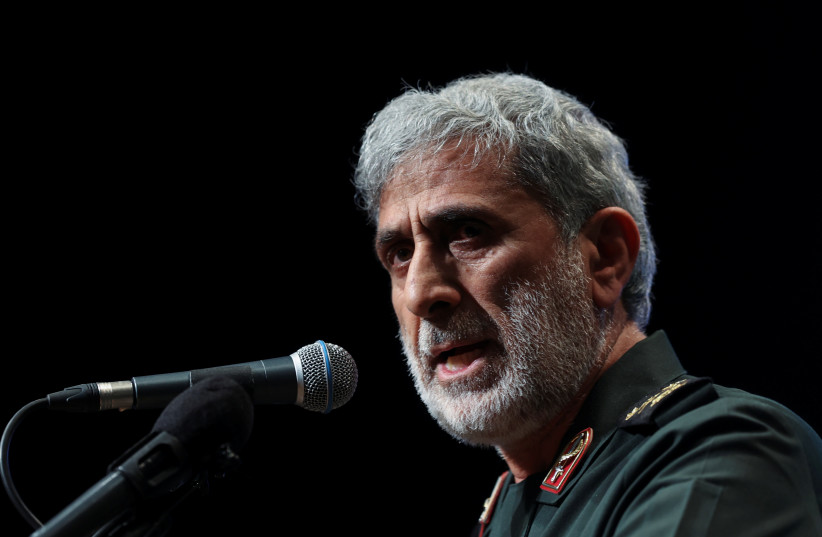In the intricate geopolitical tapestry of the chaotic Middle East, the ascendancy of Esmail Qaani as the successor to Qasem Soleimani in leading the Quds Force signifies a crucial shift in the region’s balance of power. My extensive research, informed by direct experiences in Iraq from 2003 to 2017 and corroborated by insights from a plethora of Middle Eastern counterterrorism experts, reveals a disturbing escalation of regional instability under Qaani’s leadership.
Qaani’s leadership and strategy
Esmail Qaani’s ascent to the helm of the Quds Force in the aftermath of Qasem Soleimani’s contemptuous demise has ushered in a new era of strategic maneuvers in the Middle East. While Soleimani’s leadership was marked by a bold and assertive approach, Qaani’s style is subtler yet equally impactful. His tenure is characterized by a blend of servility, sycophancy, and a seemingly weaker but strategically astute posture. Under his command, the terrorist organization of Quds Force has intensified its support for various Shi’ite and Sunni terrorist groups, equipping them with advanced ballistic missiles.
This proliferation not only extends the operational reach of these factions but also marks a continued Iranian commitment to counter American and Israeli influence in the region. The strategy mirrors the tactics employed in previous conflicts in Lebanon and Iraq, aiming to challenge and eventually drive out the US military presence.
Ballistic missile proliferation
The strategic distribution of ballistic missiles to terrorist groups by the Quds Force under Qaani’s leadership has significant implications for regional and international security. This proliferation has equipped both Shi’ite and Sunni terrorist militants with the capability to launch more sophisticated and far-reaching attacks.
The implications are twofold: first, it elevates the threat level to American and Israeli interests in the region, and second, it contributes to the overall instability of the Middle East. The distribution of such advanced weaponry not only emboldens these groups but also potentially escalates the nature of their operations, thereby increasing the risk of a broader regional conflict.

Attack on Eilat Port
A focal point of Qaani’s aggressive strategy is highlighted by the recent attack on the Israeli port of Eilat. This operation, carried out by an Iraqi terrorist faction of the Quds Force known as the Islamic Resistance, showcases the enhanced capabilities of these terrorist groups under Iran’s patronage. The use of advanced ballistic missiles in this assault is particularly alarming, signifying a significant leap in the operational capabilities of these factions.
This incident is not just an isolated act of aggression but a clear indication of the escalating tensions and the potential for more sophisticated forms of warfare in the region. The risk extends beyond conventional conflict, raising concerns about the potential pursuit of nuclear capabilities by these Iran-backed groups, a development that would have far-reaching consequences for global security.
Incident in Cyprus
The recent events in Cyprus, involving the arrest of Iranian agents targeting Israeli businessmen, shed light on the broader reach of Iran’s transnational terrorism network. This foiled operation, which was a collaborative effort between Cypriot authorities and Israel’s Mossad, reveals the meticulous planning and operational sophistication of these groups. The use of the Turkish Cypriot north as a base for orchestrating attacks against Israeli and Jewish targets is a matter of grave concern.
This strategy of utilizing disputed or less-governed spaces for terrorist activities is indicative of a broader pattern of Iran’s outlaw regime, which aims to extend its influence and operational reach beyond its borders. Such incidents underscore the need for heightened vigilance and international cooperation to counter these emerging threats.
Global security implications
The terrorist actions of the Quds Force under Qaani’s leadership have significant implications for global security. The increasing capability and reach of these Iran-backed terrorist groups, particularly in terms of advanced weaponry and potential nuclear aspirations, pose a serious threat to regional stability and international peace. This situation is further complicated by the expanding network of sleeper cells orchestrated by the Iranian regime, especially under the administration of President Raisi.
These dark cells, designed to deploy operatives for terrorist attacks in Western nations, represent a significant and direct threat to Europe and the United States. The international community must therefore recognize and address this escalating threat with urgency and decisiveness.
Soon, like their master, these individuals will be removed from the theater, destined to leave behind nothing but a legacy as negligible as a lone hand and ring.
Conclusion
In conclusion, the leadership of Esmail Qaani in the Quds Force represents a critical point in Middle Eastern geopolitics. The sustained support from Iran’s highest authorities for these aggressive actions signals a continued commitment to destabilizing the region. The international community must prioritize global peace, stability, and human rights, and develop effective counterterrorism strategies to mitigate these risks. Confronting the legacy of figures driven by destructive ambitions is imperative to pave the way for a more peaceful and stable Middle East.
The writer is a counterterrorism analyst and Middle East studies researcher based in Washington. He is a Jewish Kurd of Iran and the author of The Gruesome Mullah. See more at www.erfanfard.com.
